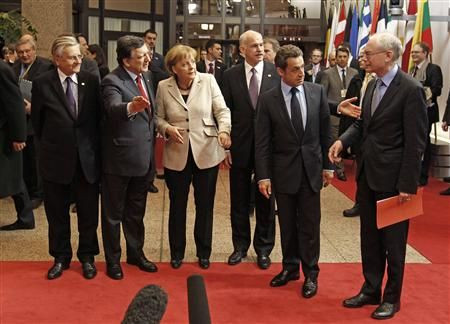EU seals deal to rescue Greece, details still murky

European leaders struck a deal to provide financial aid to Greece on Thursday, in an unprecedented move to stave off a broader crisis in the 16-nation bloc that shares the euro single currency.
The details of the package were not expected to be finalized until early next week, when EU finance ministers meet, but the bloc's leaders suggested it could include some form of loans to Greece to help it service its debt and avoid a damaging default.
As they announced the deal, EU leaders also urged Athens to make deep cuts to its budget deficit to restore confidence in its economy, and the broader euro zone, and prevent its fiscal crisis from spilling over to other high-debt states like Portugal and Spain.
There is an agreement on the Greek situation, EU President Herman Van Rompuy told reporters gathered at a summit of leaders from the 27-nation EU in Brussels.
Euro area member states will take determined and coordinated action if needed to safeguard stability in the euro area as a whole, he said.
The agreement was forged in talks between Van Rompuy, European Commission President Jose Manuel Barroso, French President Nicolas Sarkozy, German Chancellor Angela Merkel, European Central Bank President Jean-Claude Trichet and Greek Prime Minister George Papandreou.
Germany and France are expected to take the lead in providing support, in part because other big euro zone economies like Italy and Spain are themselves under financial pressure.
Economists said the plan, while short on details, was likely to enhance market confidence in Greece, which has seen its debt and equity markets hammered over the past month.
But it is also a clear sign that the bloc's fiscal rules have failed and raises moral hazard questions because Greece has a history of manipulating deficit figures to meet EU rules.
Until this week, EU leaders had avoided speaking openly about a bailout, fearful it might ease pressure on the government in Athens to enact tough austerity measures needed to bring down a deficit that hit 12.7 percent of gross domestic product (GDP) last year -- more than four times EU limits.
MARKETS WANT DETAILS
The euro spiked higher against the dollar after the deal was announced, before slipping back on the lack of detail. The yield spread between Greek bonds and benchmark German issues narrowed but then widened again.
It takes away the one-way bet on Greek debt by creating the possibility of an announcement of a detailed plan at any time in the future, Luigi Speranza, an economist at BNP Paribas, said.
If this is successful in enhancing market confidence, ultimately the bailout could not even be needed.
Polish Prime Minister Donald Tusk told reporters in Brussels that the support, which would be the first bailout of a euro zone member since the currency zone was created 11 years ago, was likely to come in the form of loans.
It could be voluntary loans from member states. That seems to be the best option, Tusk said.
Another possibility sources raised would be for Germany's state-owed KfW bank to issue bonds and use the proceeds to buy Greek debt, thereby ensuring that a sizeable portion of Greece's financing requirement is underwritten.
It was unclear whether any aid would be made available to other euro zone countries.
European leaders are keen to prevent Greece's woes from spreading to other members and plunging the currency area into a bigger crisis that could reverberate around the globe.
Greece is a part of the European Union and won't be left on its own, but there are rules and these rules need to be adhered to, Chancellor Merkel said.
White House economic adviser Christina Romer said the Obama administration was watching the Greek developments closely and believed there had been good progress.
SOCIAL UNREST RISK
Athens needs to borrow 53 billion euros ($75 billion) this year to cover its deficit and refinance debts that are expected to climb to 290 billion euros -- nearly 120 percent of GDP.
Van Rompuy called on the Greek government to implement steps to consolidate its budget in a rigorous and determined manner and said the European Commission would closely monitor progress in consultation with the European Central Bank.
He said the EU could ask Greek to take additional measures and would draw on the expertise of the International Monetary Fund.
Athens has already pledged to cut its deficit by four percentage points this year.
Even with EU support, the Greek government faces a daunting challenge to consolidate its budget and restore confidence in an economy whose imbalances were exacerbated by the economic and financial crisis and where social unrest remains a threat.
Greek unemployment hit its highest level in nearly five years, data showed on Thursday, and civil servants said they would step up strike action to protest austerity measures that include freezes on public sector wages and an overhaul of the tax system.
(Writing by Noah Barkin and Luke Baker; Additional reporting by Jan Strupczewski, Emmanuel Jarry, Julien Toyer and David Brunnstrom; Editing by Mike Peacock)
© Copyright Thomson Reuters 2024. All rights reserved.











